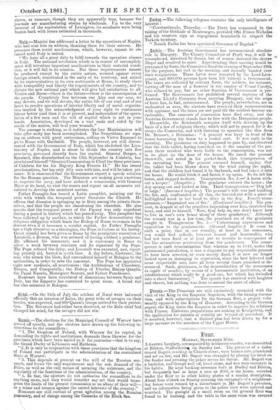5islii.—Mazzini has addressed a letter to the operatives of Naples,
who had sent him an address, thanking them for their esteem. He promises them social ameliorations, which, however, cannot be ob- tained until Italy is united.
" We have all a great duty to fulfil towards the operative classes in Italy. The national revolution which is in course of accomplish- ment will introduce important ameliorations in their material condi- tion, or it will fail in its mission. But these improvements cannot be produced except by the entire nation, secured against every foreign attack, constituted in the unity of its territory, and united by its representatives in its own metropolis at Rome, to study there with tranquillity and liberty the requirements of the country, and to dictate the new national pact which will give full satisfaction to all. Venice and Rome—there is the future—there is the emancipation of the people. Completely free between our Alps and our seas, we may devote, and we will devote, the entire life of our soul and of our heart to resolve questions of interior liberty and of social organiza- tion implied by the acknowledgment of your right to continuous labour better paid than it is at present, and independent of the specu- lation of a few men and the will of capital which is not in your hands. Association, developed on a vast scale and aided by the credit of the nation, will heal your wounds."
The passage is striking, as it indicates the line Mazzinianisai will take after unity has been accomplished. The Neapolitans are sign- ing an address with great enthusiasm, calling on Victor Emanuel to go to Rome with Garibaldi. The people, however, are still discon- tented with the Government of Italy, which has abolished the Lieu- tenancy of Naples, and is about to divide the country into five provinces, governed directly from the capital. General Borges, a Spaniard, who disembarked on the 13th September in Calabria, has proclaimed himself "General Commanding in Chief the three provinces of Calabria for his his Majesty King Francis II." He has issued proclamations, but has only fifty men with him, and will be taken pri- soner. It is rumoured that the Government expect a speedy solution for the Roman question. The Ministers are making great exertions to improve the navy, and have ordered a commission, with General Bixio at its head, to visit the coasts and report on all measures cal- culated to develop the merchant marine. Father Passaglia has issued a Latin pamphlet, pointing out the evils with which the temporal power threatens the Church. He affirms that disunion is springing up in Italy among the priests them- selves, and that the people are abandoning the churches. He also asserts that the temporal power of the Papacy was only expedient during a period in history which has passed away. This pamphlet has been followed up by another, in which the Father demonstrates the religious obligation which binds the Bishop of Rome to remain in his diocese even if it becomes a secular capitaL As Father Passaglia has a high character as a theologian, the Pope is furious at his heresy. Great scandal has been givenin Rome by the precipitate execution of Locatelli, a Roman, who was accused of having stabbed a gendarme. He affirmed his innocence, and it is customary in Rome to allow a week between sentence and its signature by the Pope. The Pope refused the delay, and Locatelli was executed, and, reject. ing priestly aid, buried in quick-lime. A day before, Castrucci, the man who struck the blow, had surrendered himself at Bologna to the authorities, in order to save the innocent. The Pope has appointed eight new cardinals, all reactionists : the Archbishops of Chambery, Burgos, and Compostella ; the Bishop of Viterbo, Bishop Quaglia, the Papal Nuncio, Monsignor Sacconi, and Father Panebianco. Rumours have been circulated of dissensions between Spain and Italy, but the Emperor has contrived to quiet them. A bread riot has also occurred at Bologna.






























 Previous page
Previous page